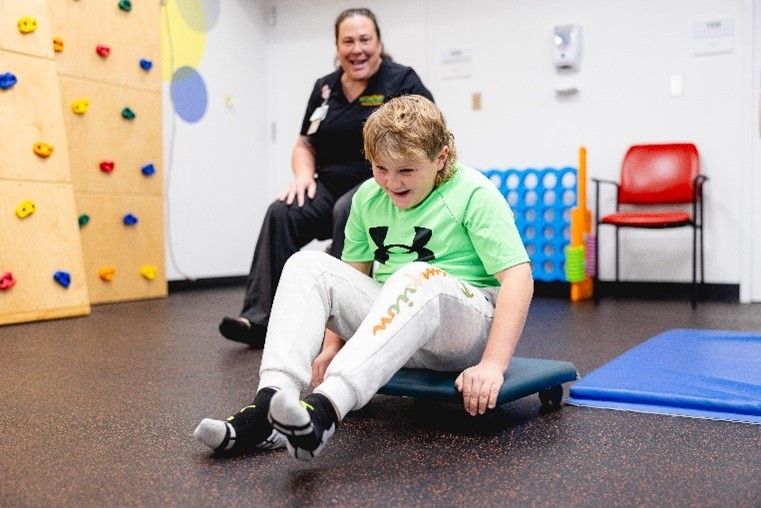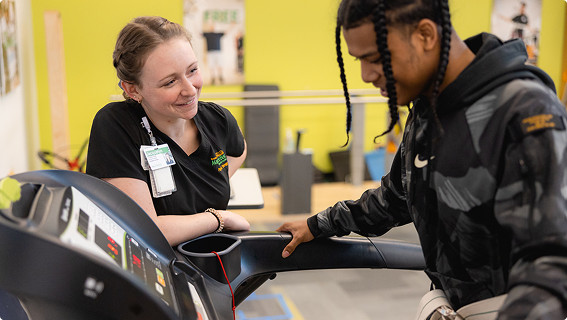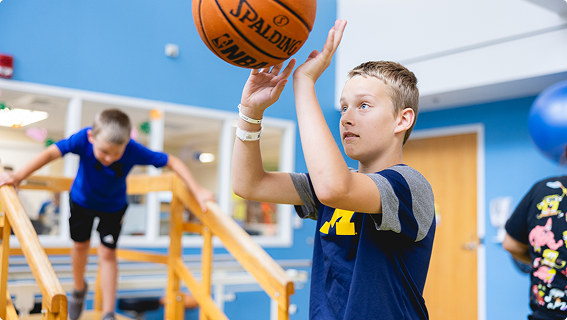Residencies and Fellowships
Pediatric Physical Therapy Residency
Why Choose Mary Free Bed’s Pediatric Physical Therapy Residency?
Expert Clinical Development
Graduates gain advanced knowledge, skills, and clinical expertise in pediatric physical therapy, becoming the clinician of choice for patients and families seeking specialized care.
Patient- and Family-Centered Approach
The program emphasizes a collaborative process that prioritizes family and patient-centered rehabilitation to deliver high-value, expert care.
Evidence-Based Practice
Residents are trained to contribute to and implement evidence-based clinical practices, ensuring the highest quality of care for pediatric patients.
Leadership and Knowledge Sharing
Graduates share their expertise with students, clinicians, and the families they serve, fostering a culture of learning and collaboration.
High Ethical Standards and Professionalism
Residents exemplify professionalism and uphold ethical excellence in all aspects of care.


The Mary Free Bed Rehabilitation Pediatric Physical Therapy Residency is accredited by the American Board of Physical Therapy Residency and Fellowship Education as a post-professional residency program for physical therapists in pediatric physical therapy. The program is designed to advance the careers of physical therapists specializing in pediatrics, with a focus on clinical reasoning, mentorship, and advanced expertise. The program equips graduates to provide exceptional care and become a leader in the field of pediatric rehabilitation.
Clinical Curriculum
The Mary Free Bed Pediatric Physical Therapy Residency provides a comprehensive curriculum rooted in the most recent Description of Residency Practice (DRP) in Pediatric Physical Therapy, as outlined by the American Board of Physical Therapy Residency and Fellowship Education (ABPTRFE).
Clinical Rotations
Residents will gain hands-on experience through primary clinical rotations across diverse settings:
- Rehabilitation Hospital (195-bed facility with pediatric specialty unit): Focus on inpatient care for patients recovering from:
- Brain injuries
- Multiple trauma
- Spinal cord injuries
- Major surgical procedures, including Single Event Multi-Level Surgery (SEMLS) and Selective Dorsal Rhizotomy (SDR)
- Outpatient Therapy Center: Treat patients with a variety of diagnoses, such as:
- Cerebral palsy
- Torticollis and plagiocephaly
- Myelomeningocele
- Developmental delays
- Autism spectrum disorder
- Toe walking
- Genetic syndromes
Additional learning opportunities are available through partnerships with local organizations, providing exposure to acute care, school systems, and early intervention settings.
Throughout rotations, residents will develop clinical reasoning skills through personalized mentoring sessions with expert pediatric therapists.
Program Details
Residents engage in supplemental activities that enhance their expertise, including:
- Specialty Clinics: Observations in Early Development, Spasticity Management, and the Center for Limb Differences.
- Rehabilitation Services: Exposure to advanced resources, such as custom wheelchair seating, adaptive technology, Orthotics & Prosthetics + Bionics and the Motion Analysis Laboratory.
Didactics
The didactic curriculum is designed to complement clinical training, utilizing the latest Description of Residency Practice (DRP) in Pediatric Physical Therapy. Residents will engage in:
- Self-Guided Modules: Flexible, independent learning tailored to pediatric therapy topics.
- APTA Pediatrics Residency and Fellowship Consortium Participation: Access to structured content and professional support.
- Mentor-Guided Discussions and Hands-On Practice: Expert-led sessions to deepen specialty knowledge.
Residents are encouraged to pursue continuing education opportunities and share their knowledge with the team, fostering collaborative growth.

Research and Teaching Experience
- Scientific Inquiry Project: Residents dedicate time to a research project, working alongside a mentor to explore a topic that contributes to pediatric physical therapy practice.
- Teaching Opportunities:
- Participate in Grand Valley State University’s Department of Physical Therapy pediatric labs, gaining valuable teaching experience.
- Collaborate with mentors to serve as part-time clinical instructors in outpatient settings, mentoring physical therapy students.
Job Details
Residents have full-time status as Mary Free Bed employees, which includes full-time benefits. The resident also will be appointed guest faculty at Grand Valley State University, which includes access to all university resources.
Fees: $400 for curriculum
Eligibility
- You must be a physical therapist or in your final year of an accredited physical therapy program.
- Applicants must have obtained State of Michigan licensure prior to beginning the residency in mid-September.

Questions
- Check out our Frequently Asked Questions (FAQ) Document here
- For program-specific questions, email PTpediatricresidency@maryfreebed.com.
- If you have further questions, email recruitment@maryfreebed.com

Faculty
- Certified in Neurodevelopmental Treatment
- Certified in the Schroth Method through the Barcelona Scoliosis Physical Therapy School
- Focus areas: Schroth Method treatment, neurodevelopmental treatment
- DPT, BS, Grand Valley State University
- Focus areas: NICU, early development, post-concussion, aquatic therapy
- DPT Andrews University; BS in Chemistry, Kalamazoo College
- Certified Brain Injury Specialist
- Focus areas: Brain injury, SEMLS/SDR
- MS PT, Grand Valley State University
- Focus areas: Early Development Program, neurodevelopmental treatment
- DPT Grand Valley State University; BS Athletic Training Saginaw Valley State University
- BS Psychology University of Indianapolis
- MS Physical Therapy East Carolina University
- Focus areas: Equipment clinic, manual therapy, post-concussion
- MSPT, BS Therapeutic Recreation, Central Michigan University
- Board-Certified Clinical Specialist in Pediatric Physical Therapy
- Certified in Neurodevelopmental Treatment
- Focus areas: Motion analysis, Advanced Management of Pediatric Spasticity (AMPS), neurodevelopmental treatment
- DPT, Grand Valley State University; BS Physiology, Michigan State University
- Certified Brain Injury Specialist
- DPT, BS Health Science, Grand Valley State University
- Certified Brain Injury Specialist
- Focus area: Pediatric Day Rehab Program
- DPT, Central Michigan University; BS in Exercise and Health Science, Alma College
Want to apply?
Applications are open for the 2026-2027 Residency year with a deadline of January 4, 2026.
Interviews will be held in February with Match Day Wednesday March 12, 2026. Please submit your application through the RF-PTCAS system.
Click here to start the application process.
For program-specific questions, email PTpediatricresidency@maryfreebed.com.
 Program Goals
Program Goals
These goals are evaluated using 20 key performance indicators.
Comprehensive Learning and High-Quality Care
Equip residents with post-professional experiential learning in pediatric physical therapy, who have a comprehensive understanding of pediatric PT practice and provide high-quality care to patients/students and families.
Advanced Clinical Expertise
Develop highly trained clinicians who deliver evidence-based, high-quality care as part of an interdisciplinary team.
Ethical Decision-Making and Professionalism
Empower physical therapists to practice ethical clinical decision-making while demonstrating professionalism and virtuous behavior.
Contributing to the Profession
To develop physical therapists into practitioners who value and contribute to the profession of physical therapy and the healthcare community through evidence-based practice, teaching, and advancing the body of knowledge in pediatric physical therapy.
Program Excellence
Maintain a high-caliber residency program and uphold ABPTRFE accreditation as a leading pediatric residency.
Specialist Preparation
Cultivate clinician expertise in pediatric physical therapy, preparing participants to pursue APTA Pediatric Clinical Specialist Certification (PCS).
 Program Outcomes
Program Outcomes
These outcomes are assessed using 27 key performance indicators.
Graduates of the residency program will:
Master Foundational Knowledge
Demonstrate a comprehensive understanding of the foundational knowledge for pediatric clinical practice aligned with the knowledge areas and client/patient management areas of the Description of Residency Practice – Pediatrics.
Provide Advanced, Evidence-Based Care
Deliver high-quality, evidence-based clinical services to the community, incorporating appropriate, best practice strategies, innovative techniques, and advanced knowledge across all practice settings while serving as part of an interdisciplinary team.
Exhibit Professional Excellence
Exhibit high standards of ethical clinical decision making, virtuous behavior and professionalism.
Contribute to the Profession
Exemplify dedication to evidence-based practice and the advancement of the physical therapy profession through clinical teaching and scientific inquiry.
Achieve Specialist Readiness
Meet the qualifications and be prepared to sit for the ABPTS Pediatric Clinical Specialist Certification Exam within two years of program completion.
Program Success
- Graduation rate: 100%
- Program goal passing rate: 100%
- Participant outcomes passing rate: 95%
 Research
Research
Each year, the resident presents his or her findings at Mary Free Bed Rehabilitation Hospital’s Interdisciplinary Grand Rounds. Listed below are the citations for the residents’ additional presentations and links to the published works.
Huegel M, Kenyon L. Application of the clinical practice guideline for congenital muscular torticollis: a case report.
Pediatr Phys Ther. 2019;31:E1-E5. doi: 10.1097/PEP.0000000000000569.
Huegel M, Kenyon L. Commentary on “pediatric physical therapists’ use of the congenital muscular torticollis clinical practice guidelines: a qualitative implementation study”.
Pediatr Phys Ther. 2019:337. doi: 10.1097/PEP.0000000000000640.
Huegel M, Otieno S, Kenyon L. Validity of the WST and the WST-Q in children with spina bifida: a pilot project.
Disabil Rehabil Assist Technol. 2019;14(7):744
Visser A, Westman M, Otieno S, Kenyon L. A home-based body weight-supported treadmill program for children with cerebral palsy: a pilot study.
Pediatr Phys Ther. 2017;29:223-229. doi: 10.1097/PEP.0000000000000406.
Kenyon L, Westman M, Hefferan A, McCrary P, Baker B. A home-based body weight supported treadmill training program for children with cerebral palsy: a case series.
Physiotherapy Theory and Practice. 2017;33(7):576-585. doi: 10.1080/09593985.2017.1325956.
Fisher-Pipher S, Kenyon L. Management of bilateral complex regional pain syndrome in a pediatric patient.
Pediatr Phys Ther. 2015;27:443-451. doi:10.1097/PEP.0000000000000175.
Fisher-Pipher S, Kenyon L, Westman M. Improving balance, mobility, and dual-task performance in an adolescent with cerebral palsy: a case report.
Physiotherapy Theory and Practice. 2017;33(7):586-595. doi:10.1080/09593985.2017.1323359.